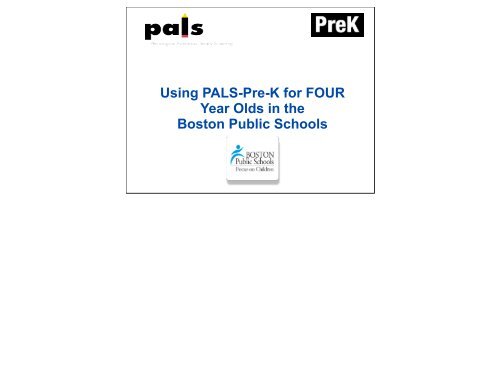PALS-PreK Training.key - BPS Early Childhood - Weebly
PALS-PreK Training.key - BPS Early Childhood - Weebly
PALS-PreK Training.key - BPS Early Childhood - Weebly
You also want an ePaper? Increase the reach of your titles
YUMPU automatically turns print PDFs into web optimized ePapers that Google loves.
Using <strong>PALS</strong>-Pre-K for FOUR<br />
Year Olds in the<br />
Boston Public Schools
<strong>PALS</strong>-<strong>PreK</strong> is<br />
Phonological Awareness Literacy Screening for Preschool<br />
A scientifically-based measure of young children’s<br />
understandings of literacy fundamentals<br />
Designed to be administered in fall and spring of the 4year-old<br />
preschool year, but could also be administered<br />
mid-year<br />
A direct means of matching early literacy instruction to<br />
specific literacy skills
<strong>PALS</strong>-<strong>PreK</strong><br />
Measures children’s development early<br />
Offers guidance to teachers for tailoring<br />
instruction to children’s specific needs<br />
Presents information in formats accessible to<br />
administrators, teachers and parents<br />
Can be a valuable part of early literacy efforts<br />
aimed at ensuring all children learn to read
<strong>PALS</strong>-<strong>PreK</strong> Administration<br />
One-on-one, administered by teacher<br />
Takes 25 minutes per child<br />
Conducted Fall & Spring<br />
Tasks can be administered in increments
<strong>PALS</strong>-<strong>PreK</strong> Tasks<br />
Alphabet Knowledge<br />
Upper-case Alphabet Recognition<br />
Lower-case Alphabet Recognition<br />
Letter Sounds<br />
Beginning Sound Awareness<br />
Print and Word Awareness<br />
Rhyme Awareness<br />
No Longer testing children on Name Writing and Nursery Rhyme.<br />
Children should be given other opportunities to practice name writing daily.<br />
Most children have not been exposed to Nursery Rhymes and do not want to penalize
15 or fewer<br />
Alphabet Knowledge<br />
16 or greater<br />
8 or fewer<br />
Conditional Task Sequencing<br />
9 or greater<br />
Proceed to Beginning Sound Awareness Task<br />
Child is shown a page of letters and asked to name them<br />
Start with Upper Case letters, because they have more distinctive features than lower case<br />
Alphabet recognition has consistently been the best predictor of later readin achievement<br />
Conditional task sequencing is designed to prevent the child from being frustrated
Beginning Sound Awareness<br />
Sound Production task<br />
Instructionally transparent<br />
*Do not administer Rhyme and<br />
Beginning Sound next to each other<br />
Explain task<br />
Gets directly at phonological awareness by requiring initial phoneme segmentation in an oral production format<br />
Can help teach the task, models a good way to introduce and reinforce this skill
Adapted from Justice and Ezell<br />
Print and Word Awareness<br />
Natural book-reading format<br />
Use script to ask questions as<br />
indicated<br />
Administration and Scoring unique<br />
for each item<br />
Ecologically Valid – reading books with kids and calling attention to print are things they should do every day
Explain task – teacher names pictures<br />
Rhyme Awareness<br />
*Do not administer<br />
Rhyme and Beginning<br />
Sound next to each other
Interpreting <strong>PALS</strong>-<strong>PreK</strong> results<br />
Spring developmental ranges for 4-year-olds<br />
<strong>PALS</strong>-<strong>PreK</strong> tasks Spring<br />
Developmental<br />
Range<br />
Maximum Score<br />
Upper-Case Alphabet 12-21 26<br />
Lower-Case Alphabet 9-17 26<br />
Letter Sounds 4-8 26<br />
Beginning Sound<br />
Awareness<br />
Print and Word<br />
Awareness<br />
5-8 10<br />
7-9 10<br />
Rhyme Awareness 5-7 10<br />
* If child achieves Spring Range in Fall, DO NOT re-test.<br />
Chapter 3 in the <strong>PALS</strong>-<strong>PreK</strong> teacherʼs manual talks about interpreting results-instructs teachers to look at the scores and identify areas where<br />
children could benefit from further instruction.<br />
The Spring Developmental Ranges were identified using longitudinal data (which comes next)
<strong>PALS</strong> Scoring Sheet<br />
11
<strong>PALS</strong> Scoring Sheet<br />
http://bpsearlychildhood.weebly.com/<br />
assessment-tools--resources.html<br />
email to Beth Benoit,<br />
bengel@boston.k12.ma.us<br />
12







